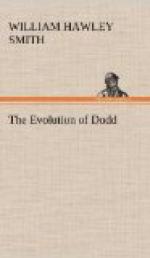And this was all there ever was of this episode. Mr. Bright never once mentioned the occurrence to “Dodd” afterwards. He did not even reprimand him before the school nor did he speak to any pupil of what had happened. He had won, and yet the odds were so nearly against him that be felt it best to be silent. This might not have been your way, beloved, but it was Mr. Bright’s way, and he was able to manage it.
Some months thereafter, he had occasion one day to reprove a rough pupil for profanity on the play-ground, and the pupil came back at him with: “You’d better talk to ‘Dodd’ Weaver about swearing if you are so anxious about it. He cursed you to your face and you didn’t say a word.” But Mr. Bright only replied: “That is my affair, but you must not swear on the play-ground. Do you understand?”
The young man concluded that he understood, and said so.
And that is how this teacher was perhaps logically inconsistent, but nevertheless just, and able to take care of his school according to the individual needs of his pupils. Happy is that teacher who can do so much!
But the machine cannot do so much, nor can the men who run the machine. The machine is logically correct and consistent, according to the laws of the Medes and Persians. It “treats all pupils alike.” Allah be praised! Yet a single man like Mr. Bright is worth whole battalions of machines. Thank God!
I must take space, just here, too, to explain a phrase quoted by Mr. Bright, just above, namely, the “Other-Fellow.”
The quotation marks are there in deference to Dr. Holmes, who is responsible for the idea that Mr. Bright had made familiar in his school. That idea was as follows, when elaborated by this teacher, and was presented to his pupils on a Monday morning, a few weeks after “Dodd” had entered school. I give this as Mr. Bright paraphrased it, rather than in the words of the “Old Master” in the “Poet at the Breakfast Table,” where he first came across it.
“Dr. Oliver Wendell Holmes says,” Mr. Bright remarked to the school, “that in every one of us there are two persons. First, there is yourself, and then there is the Other-Fellow! Now one of these is all the time doing things, and the other sits inside and tells what he thinks about the performance. Thus, I do so-and-so, act so-and-so, seem to the world so-and-so; but the Other-Fellow sits in judgment on me all the time.
“I may tell a lie, and do it so cleverly that the people may think I have done or said a great and good thing; and they may shout my praises, far and wide. But the Other-Fellow sits inside, and says, ‘You lie! you lie! you’re a sneak, and you know it!’ I tell him to shut up, to hear what the people say about me; but he only continues to repeat, over and over again, ’You lie! you lie! you’re a sneak, and you know it!’
“Or, again, I may do a really noble deed, but perhaps be misunderstood by the public, who may persecute me and say all manner of evil against me, falsely; but the Other-Fellow will sit inside, and say, ’Never mind, old boy! It’s all right! stand by!’




